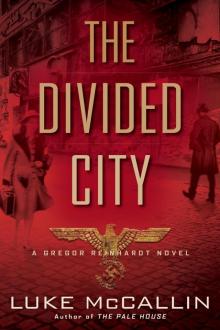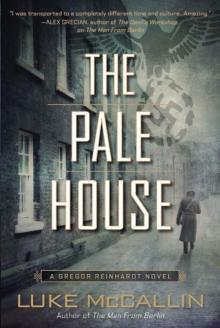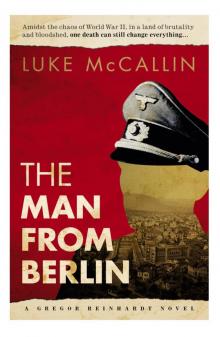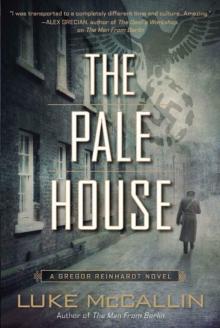- Home
- Luke McCallin
The Man from Berlin Page 3
The Man from Berlin Read online
Page 3
‘Dressed like that?’ Begović quipped. ‘I would certainly hope so.’ Padelin snarled something at him in Serbo-Croat. Begović sat up a bit straighter in the chair and answered back, but Padelin cut him off. Begović sighed and switched back to German. ‘I don’t know. I can’t tell. The pathologist will know, soon enough.’
‘You said most of the wounds she got here on the bed. Where did it start? The stabbings, I mean.’ Reinhardt got down on his hands and knees to peer under the bed, squinting around the curl of smoke that drifted across his eyes.
Begović stared down at Reinhardt’s back and pointed unnecessarily with his notebook to the foot of the bed. ‘There, I think. A spray of blood across the bed hangings. Find something under the bed?’ Padelin knelt to see what Reinhardt had seen. He straightened up.
‘And is a forensics team coming?’ Reinhardt asked Padelin.
‘Yes.’
Reinhardt studiously made a point of not looking at Begović, himself engrossed in watching the tip of his cigarette burn. ‘Make sure they know there’s a bottle and a glass, probably not the woman’s, under the bed.’ He looked around the room, at the drawn curtains and the lights. ‘Do you know whether the room was lit like this when the police arrived?’ he asked Padelin.
‘I can ask the maid.’
‘Please do,’ said Reinhardt. ‘Are you nearly finished?’ he asked Begović.
‘Yes. Why do you think it’s not the woman’s?’ asked Begović.
Reinhardt pointed at the glass on the table. ‘She lived here. Stands to reason she’d use the side of the bed nearest the bathroom.’
Begović nodded, his mouth making an O. ‘Well, I’m all done, unless you gentlemen need something else?’
Reinhardt looked at Padelin questioningly. The big detective shook his head. ‘Wait downstairs, please, Doctor.’
‘Shall we have a look in the bathroom?’ asked Reinhardt, as the doctor left. He dropped his cigarette stub into his little tin and pocketed it, letting Padelin go first, watching. The detective walked right in, standing in the middle of the room. Reinhardt paused in the doorway. It was lavishly equipped, with a huge white bath, gold taps, an ornate showerhead. Tiles in a repeating blue-and-gold motif ran around the room at waist height, and a mirror in a mosaic frame that looked Spanish hung over the sink. Toothbrush, toothpaste, French cosmetics on the white enamel sink. Towels and brushes on a set of tall wrought-iron shelves, from which hung a black silk dressing gown. And luxury of luxuries, a toilet with a shiny wooden seat.
Casting an eye around the room, Reinhardt spotted the blood marks on the wall on either side of the toilet, and a bloody towel wadded up and thrown into a corner. Large as the room was, Padelin filled the space with his bulk, watching Reinhardt with those dead, catlike eyes. Reinhardt peered into the toilet, but it was empty. Blood marks on either side of the sink, as if someone with blood on their hands had leaned on it for balance or support. He stared around the room once more, trying to imagine what had happened and what he might be missing. Putting his tongue between his teeth, he sighed, turned and walked out, back into the bedroom.
Padelin joined him there. ‘The maid is waiting to be questioned,’ he said, quietly. His German was slow and ponderous.
Reinhardt nodded. ‘I need to have a look at the other body first.’
‘You do that,’ said Padelin, in a tone that implied Hendel was all Reinhardt’s. ‘I will see what she has to say.’
3
Hendel had been poster-boy good-looking. Chiselled features, blue eyes, blond hair. The works. Looking up at the wall, Reinhardt could see where Hendel’s head had struck it, traced the long smear of blood the body’s sliding fall had left before it came to rest there, shoulders slumped across the skirting board, one ankle crossed beneath the other. Hendel was in uniform, but whoever had shot him had emptied his pockets and removed his rank insignia, hoping, Reinhardt guessed, to delay identification. It would have worked, if one of the Feldgendarmes who responded to the call had not recognised him.
For once, Reinhardt thanked Hendel’s habit of staying out late with the ladies and the number of times the Feldgendarmerie must have fingered him stumbling back to barracks late and drunk. He lifted Hendel’s leg by the boot. As with Vukić, the rigor mortis was almost gone. He could not have died much more than a day ago. Definitely about the same time as her.
Reinhardt walked across the living room and entered a study. To his left, a tall window looked out on the garden. Against one wall was a large, heavy-looking table, the wood worn smooth and rich with age, but he did not pay much attention to it because above it, and arranged haphazardly all over the wall, were photographs in black frames. In most of them, Marija Vukić stared or laughed or pouted out at him with an intensity that made his stomach suddenly clench, remembering how they had talked at that dance. Not for long, mostly about Reinhardt’s time in the first war, but for as long as he had talked she had listened with a particular intensity, blue eyes boring into his.
Marija in flying gear, posing next to the wing of an old biplane. Marija with her hair flying about her face as she looked down from the railing of a ship, an elderly man at her side. Marija swathed in robes and turban on a camel, two Africans either side of her. Marija at a table filled with people, the glare from the flash reflected in the glasses of champagne in front of them. Pictures of Berlin, Paris, Trafalgar Square almost blotted out by a flock of pigeons caught in the moment of lifting off. Places in Africa, in Asia. Pictures of people, Germans, French couples on café terraces, families picnicking on lawns, Japanese in traditional dress, Africans, soldiers.
Lots of pictures of soldiers. A man in an old Austrian Imperial Army uniform leaning on a rifle in a trench with his feet in water. A mutilated soldier slumped against a brick wall, outstretched hand holding a begging bowl. A picture of an officer on horseback. Columns of infantry, Germans, with slung rifles, blond hair blowing in the breeze. Reinhardt swallowed in a suddenly dry throat, eyes drawn back and caught by that soldier with his head down, begging. There but for the grace of God, he thought…
From downstairs came the sudden sound of a man shouting. Faint, beneath it, a woman crying. Frowning in distaste, Reinhardt looked away from the begging soldier and found himself staring at a picture of the Führer. Whoever had taken it had shot him through a crowd of uniforms, black sleeves, and swastikas, some with the Ustaše armbands, and all the faces were looking one way with expressions of anticipation and delight, but he was looking straight at the camera, away from everyone else, face utterly expressionless. Reinhardt shivered suddenly, turned his head away.
Down the other wall were shelves filled with books and objects, floor to ceiling. Reinhardt cast a cursory eye over them as he walked slowly over to the other door, which was closed. Taking a handkerchief from his pocket, he opened it slowly, pushing the door open onto darkness, a faint suggestion of surfaces and cabinets appearing out of the gloom, and a smell of chemicals that peaked and faded, as if it had just been waiting for the door to be opened. Peering around the door, he found the light switch, flicked it on. It was a darkroom, and it had been ransacked. Photos blanketed the floor, cabinet doors were open, a drawer lay on the floor. Bottles of fluid, brushes, clips, and string stood or lay strewn across work surfaces. A pair of scissors lay in an empty enamel sink.
‘Shit,’ muttered Reinhardt. He took a step into the room, knelt, and looked down at the photos scattered across the floor. Soldiers again, most of them. Modern photos, and recent as well, if he was any judge of uniforms. He brushed aside a photo to reveal one of what looked like Afrika Korps soldiers, men swathed in scarves and dust riding atop tanks in column and, for a moment, he was back there with them under that baking sun. Another one, Marija with goggles drawn down around her throat with a man in uniform, a minaret needling the sky behind them, a swath of sea the backdrop to it all. Frowning, Reinhardt leaned closer, then smiled in admiration. The man
was Rommel, peaked cap, leather coat, binoculars and all, just as in the pictures. There were steps behind him, and Claussen came to a stop in the doorway.
‘Sir?’
‘A moment, Sergeant.’ Reinhardt straightened and ran his eyes around the room, over the jumble of pictures and paraphernalia that littered the surfaces. There was a cupboard under the sink with its door ajar, and something metallic glittered back at him. Stepping carefully, he reached out and pulled the door open wider. A couple of film cases, round tins of various sizes, stood haphazardly in a curved rack that was otherwise empty. The tins had been opened, and the beginning of each roll of film had been unwound, then put back. He reached in and took the end of the nearest roll between his fingertips and turned and lifted it to the light. He passed the strand of film through his fingers but it was blank. The rest of the rack, where there was space for a couple of dozen tins, was empty. He nodded to Claussen.
‘The uniforms told us the neighbour might have seen something.’
‘Anything else?’
‘Not really, sir, and I was free with the smokes. Hueber did most of the talking, but they’re being pretty close-lipped. Especially after that big fellow gave them a right beasting before he left.’
‘Yes, I saw that.’
Reinhardt looked around the room again. He doubted he would be back so whatever he needed to take in terms of impressions or conclusions from the murder scene, he needed them now. Taking a deep breath, he turned back into the study, looking down its length, running his eyes over the books in a half dozen languages, objects that looked like they had been collected in a dozen countries.
‘Bloody hell, sir,’ came Claussen’s voice from the darkroom. ‘There’s pictures of her here with about every general in the Wehrmacht. Guderian. Hoth. There’s one here with Kesselring. One with Goering…’ Claussen’s voice trailed off into muttered remarks.
Taking his handkerchief from his pocket again, Reinhardt opened the desk drawers one by one but saw no sign of anything that looked like an address book. Straightening, he looked back at the bookcase. On a bottom shelf, next to the door, he spotted a gap, books missing. Squatting, he ran his eyes over them. They were all of differing sizes and textures, but each one was carefully annotated along the spine with dates. He opened one or two at random. They were journals, or diaries. They went back a long way, until 1917, the later years covered by two, even three books. The writing was wide and childish in the earlier ones, closer and neater, denser, in the later ones. Pursing his mouth he stared at where the journals for 1942 and 1943 once were. Looking around, he noticed how much it resembled a man’s room, rather than a woman’s.
Claussen was standing not far away, seemingly absorbed in the picture of the begging soldier. Reinhardt straightened up. ‘Sergeant?’ he said softly.
Claussen turned and looked at him, then back at the picture. ‘You know, for a moment, I thought that it looked like a friend,’ he said softly. ‘Boeckel. Poor sod got most of himself blown off at Naroch.’ The sergeant shook his head, and Reinhardt left him to it, running his eyes over the room one last time and walking back into the living room.
Standing in the centre of the room he looked around, turning slowly, trying to imagine what had happened. There were two glasses on the coffee table. There was a fight. Someone kills the soldier. Takes Vukić into the bedroom, rapes her, beats her. Stabs her to death. No. That did not feel right. Besides, there were the champagne glasses in the bedroom. Vukić and whoever was with her, they took their time, had fun about it. So what went wrong? And why was Hendel shot, when Vukić was stabbed? He looked from the bedroom to Hendel’s body, the study, the ransacked darkroom. Back to the bodies, where Hendel lay sprawled across the floor, and Vukić, seemingly at rest on her bed.
Someone was looking for something, came the thought. Searching the study, the darkroom. But they heard a noise… He shook his head. It felt elusive, too light. Not enough evidence.
He turned as Claussen came into the room. ‘I’m going to go and find my new partner. Inspector Padelin.’
‘He’ll be the one giving the maid hell, would he?’ quipped Claussen. As they arrived at the stairs, Reinhardt paused, looking up as the sound of voices drew him down.
‘Sergeant, have a quick look up there. Don’t touch anything. Just see what’s there.’
The kitchen was as well appointed as the bathroom upstairs. On a chair in a corner, with Padelin looming over her, sat an elderly lady in a neat black uniform and a cleanly pressed and starched apron. Her hair was grey, tied up behind her head in a bun. She swallowed a sniff as he came into the kitchen and rose quickly to her feet, did a little curtsy. Reinhardt watched her the whole time, saw the fear shoved back in watery little eyes at the sight of him, but the urge he once had to reach out and calm people like her was long gone, quashed deep inside him. It only ever confused them anyway; people did not expect sympathy and understanding from people like him, not anymore.
He looked questioningly at Padelin, who looked down impassively at the maid. She shook her head, not able to look up at him and whispered something into a crumpled handkerchief.
‘She has told me what she knows.’
‘I look forward to hearing it,’ said Reinhardt. He glanced around the kitchen again. It was neat, tidy, smelling of polish and a faint smell of spices. The only thing drawing his eye was a padlock hanging from a tall cupboard door by the stairs. ‘Just ask her one thing, if you would. Does she know where her mistress kept an address book?’ Padelin rapid-fired a question at the maid, who peered at him over the ripple of her knuckles. She looked at Reinhardt as she replied, gesturing upstairs. She sniffed as Padelin answered for her, her eyes flickering back and forth between the two of them, hands clenched hard around her handkerchief.
‘Upstairs in the study. A red leather book.’
‘It would seem it’s gone.’
As the two of them went out into the hallway, Claussen came downstairs. Padelin looked hard at him, and then at Reinhardt. ‘Who is this?’
‘This is Sergeant Claussen. He is assisting me.’ Claussen nodded cordially at Padelin.
‘What were you doing up there?’
‘Checking the top floor. There’s nothing there, sir,’ he said to Reinhardt. ‘All the rooms have been closed up for a while. Sheets over the furniture. It hasn’t been cleaned in a while. My boots left marks in the dust, and mine were the only tracks up there.’
Padelin said nothing, only stared at Claussen. Claussen, unfazed, stared back. ‘And the ground floor, Inspector? What do we have down here?’
The detective turned his eyes slowly from Claussen. ‘Downstairs was the father’s apartments. The parents were divorced, said the maid. Father and daughter lived here. But he was killed last year by Četniks, and the maid said these rooms have not been used since then.’ He turned and went back outside.
Reinhardt and Claussen exchanged glances. ‘Sergeant, quickly, go upstairs and have a look at the bodies. Just look at them. I’ll ask you later what you think.’ Claussen nodded, and then Reinhardt followed Padelin out, holding back when the detective began talking to three uniformed policemen. Hueber was hovering nearby, and Reinhardt motioned to him to listen to what was being said while he went back over to their car.
Padelin gave a flurry of orders to his men, then came over to Reinhardt’s car. Reinhardt offered him a cigarette, which he again refused. Lighting his own, he waited for the detective to tell him what the maid had said.
‘The last time the maid saw Vukić was Saturday morning. She was asked to prepare food and drinks for Vukić and a guest. A man. She does not know who the man was, but she’s positive it wasn’t to be your officer. Hendel, she knew. This other one, she didn’t.’ Reinhardt took a deep pull on his cigarette and nodded for him to continue. ‘She has Sunday off. She came in this morning, found the bodies, and called the police. According to her, when Vukić was
n’t travelling, she kept a busy social agenda. Lots of parties and outings. People coming and going.’
‘Very good. So we need to find some of these friends. Talk to them. See what they know.’
Padelin grunted assent, those eyes flat, far back in his head. ‘That is for us, I think.’
Reinhardt pursed his mouth and stared at the ground. Not much to go on, his new partner already playing jurisdiction games, and they were the best part of two days behind the killer, or killers. He raised his head. ‘There is something I heard about a witness who might have seen something on the night of the murder?’
Padelin blinked slowly and nodded. ‘Hofler. The old lady across the alley. She saw a car on Saturday night.’
‘Hofler? A German? I’d like to talk to her. Coming?’
4
The two of them headed over the narrow road and away from Vukić’s house. The houses up here were beautiful, set in large lawns, with all the space the city lacked. ‘Who lives up here?’ Reinhardt asked, as they walked.
Padelin glanced around as he spoke. ‘Only the rich live out here. Bankers. Lawyers. Businessmen.’
‘And how did Vukić come by the house she was in?’
‘The maid said it was her grandfather’s.’
Reinhardt nodded. ‘And the father? What happened to him? The Serbs got him?’
Padelin’s strides were heavy, his arms hanging almost unmoving from his wide shoulders. ‘Yes. The father was a senior Ustaše official,’ he said, referring to the governing political party in the NDH. The Ustaše were fascists, and quite incredibly brutal about it, to the extent that their excesses sometimes even turned the stomachs of their German allies, and had thrown up two main resistance movements in Bosnia: the Četniks, Serb nationalists and royalists led by a former colonel in the Yugoslav Army called Mihailović, and the more formidable Partisans, who were Communists and, far more worryingly, multiethnic, led by a man known only as ‘Tito’. ‘Četniks killed him in an ambush in Herzegovina, down near Gacko.’ He turned at a house a couple of hundred metres up from Vukić’s, with a high, pointed roof and walls of red brick. Reinhardt finished his cigarette and tossed the butt onto the road as Padelin rang the doorbell and heard a dog bark somewhere inside. A maid dressed in a neat, black uniform with a white lace apron answered the door. She ushered them in and asked them to wait a moment in the hallway while she announced them. She whispered down the hall and vanished into the main living room. A shrill, imperious sounding voice rang out in Austrian-accented German.

 The Divided City
The Divided City The Pale House
The Pale House The Man from Berlin
The Man from Berlin The Pale House (A Gregor Reinhardt Novel)
The Pale House (A Gregor Reinhardt Novel)